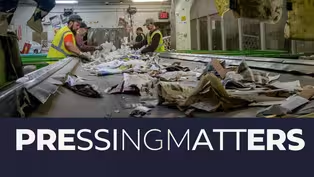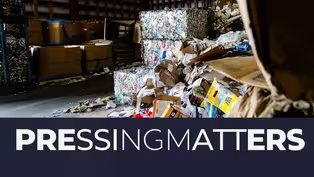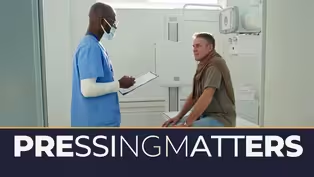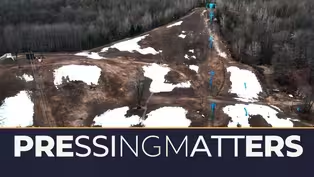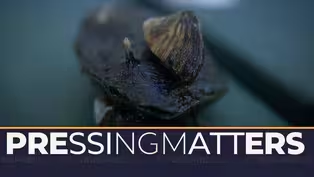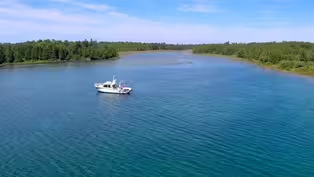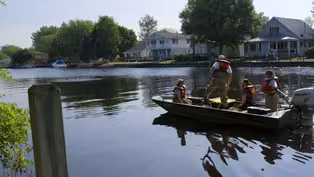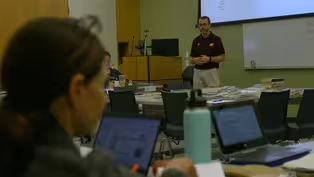Pressing Matters
Pressing Matters | Rising Cancer Rates in younger Adults
Clip: Season 1 | 12m 1sVideo has Closed Captions
Pressing Matters examines Rising Cancer Rates in younger Adults
Pressing Matters examines Rising Cancer Rates in younger Adults
Problems playing video? | Closed Captioning Feedback
Problems playing video? | Closed Captioning Feedback
Pressing Matters is a local public television program presented by WCMU
Pressing Matters
Pressing Matters | Rising Cancer Rates in younger Adults
Clip: Season 1 | 12m 1sVideo has Closed Captions
Pressing Matters examines Rising Cancer Rates in younger Adults
Problems playing video? | Closed Captioning Feedback
How to Watch Pressing Matters
Pressing Matters is available to stream on pbs.org and the free PBS App, available on iPhone, Apple TV, Android TV, Android smartphones, Amazon Fire TV, Amazon Fire Tablet, Roku, Samsung Smart TV, and Vizio.
Providing Support for PBS.org
Learn Moreabout PBS online sponsorshipTurning our attention to the latest cancer rates now.
New research from the American Cancer Society shows cancer rates are increasing for people aged 50 years and younger.
Now there are three main age groups established by the American Cancer Society, adults 65 and older, adults 50 to 64 years old, and adults younger than 50.
New studies show people aged younger than 50 years.
Were the only ones of these three age groups to experience an increase in overall cancer cases.
Now one important piece to mention, while cases are increasing, death rates for most cancers are dropping.
So to shed some light on these findings and treatment options here in central and northern Michigan are doctors George Kikano Dean at CMU College of Medicine, and Dr. Melwyn Sequeira, oncologist with MyMichigan Health.
Welcome both.
- Thank you.
- Thank you.
- Thanks for being here.
What factors do you think are contributing to an increase in these in younger adults?
- There's so much happened over the past several decades around cancer.
When I went to school, cancer used to be death sentence.
- Yeah.
- At this point, people are living with cancer.
Most cancers are treatable.
Many of them are curable.
So people are living with cancer.
The other part of the equation that we have so many diagnostic tools, whether it's clinic tools, testing, blood work, other things we do to detect cancers early.
So that detection of early cancer, for example, colon cancer colonoscopy, has shifted early diagnosis, which is correlates with better outcomes, better treatment.
Having said that, the absolute number of cancers shifting to a younger age is true.
And this is contributing to many factors.
Some of them are lifestyle changes.
This links the, the cancers you mentioned are mostly GI cancer.
So the link to diet, the link to obesity, poor food choices, and obviously environmental factors.
So the lifestyle changes that's leading to GI cancer, colon cancer, pancreas cancer, cold bladder cancer in a younger population, as well as environmental factors, potential exposure as early as infancy and beyond.
- So when you, when you say environmental factors, what exactly do you mean?
Is it things that we're breathing?
Is it things that we're eating?
You know, you did mention diet, but how about those additional environmental factors?
- So as Dr. Kikano mentioned, it's all a combination of our genetic makeup, our interaction with the environment, and finally our lifestyle changes and modifications we need to make to live a healthy lifestyle.
Now talking about dietary changes, it has a significant impact on colorectal cancer and the rates of increased colorectal cancer we are seeing.
So making healthy choices are very important, including reducing the amount of sugary beverages we consume, ultra processed foods that we eat, increasing the amount of fiber in our diet.
We know that increasing amount of fiber is important to changing the biome, the microbiome that lines our gut.
And that's a very important factor that we need to take into account.
So making healthy choices as far as the diet we consume.
For example, if we have a healthy breakfast with whole grains, cereals, lots of nuts and berries or avocado, something of that nature, increasing the fiber definitely reduces colorectal cancer incidents and changes the microbiome to more healthy one.
- And we talked ahead of time, colorectal cancer is the number one, like has seen the biggest increase in cases, correct?
- That's correct.
- Okay.
Do we know that if along with those higher cancer rates in younger adults, is the cancer also more difficult to treat?
Or is there higher mortality rate or not?
- This is actually good news because I mean early detection leads to better outcome.
And we have so many treatment modalities, surgical and medical now that have been very effective with lower side effects.
So the overall mortality from cancers has gotten down both for the older population and for the younger adults.
I mean four, I mean 45 to 60.
- Yeah, - Childhood cancer, infancy cancers are different.
- So let's talk about Central.
northern Michigan is a very large area.
We have many people living in rural and remote areas.
How is the healthcare system here able to impact cancer prevention, detection, and treatment?
- So the important part of that is education and then getting up patients to be knowledgeable about what cancer risks they have coming in from their family side and choices they make as far as looking after themselves, and then going to see their own primary care physician as a baseline starting mechanism to helping reduce that burden of cancer.
So most cancers are preventable, and as Dr. Kikano mentioned, most cancers are found in the early stages, yields the best results as far as survival goes.
The sad part is that one third of colorectal cancers are still found only in the early stages.
The rest of them are found in the advanced stages.
So if we can shift that trend from the one third local to increase that trend, that would make a significant impact in reducing colorectal cancer.
So get to see your doctor, know your family story.
If there's a family story of multiple cancers running in the family across many sites, if they're spread across two generations, or if there's one cancer that happening in an individual less than 50 years of age, that should set alarm bells ringing and ask for you to see your doctor and talk to them about the potential risk of cancer in you.
- Sure.
- And the other piece of it, I mean in in this region, even though we're semi-rural and we're surrounded by rural communities.
- Yeah.
- Access to these screening tests is available.
- Yeah.
- There's no reason not to get a mammogram.
There's plenty of homography units around here, colorectal screening, whether it's colonoscopy or home tests.
So screening modalities for the most common cancers are available in the region.
- I can't speak from experience, but I can only imagine that someone who does receive a cancer diagnosis, it has to be devastating.
So for someone who has been diagnosed with cancer, what do next steps look like for them?
- So next steps, the first and foremost is to see a doctor, establish what stage you are.
Most treatment is still available locally, and we have experienced providers entirely out here in the region to take care of most early cancers, be it breast, colorectal, lung, thoracic.
We have surgeons in this area who can take care because surgery is the mainstay of early breast cancer or early colorectal cancer treatment.
So there are plenty of providers in this region that can treat and take care of those problems.
But in addition, we have medical oncologists, radiation oncologists, spread throughout this entire mid and northern part of our state that can readily take care of you and provide you with the best initial care.
Obviously we are all in in in communication and work with our academic partners across the health system to provide the advanced and specialized personalized care that occasionally a patient ma may need.
But see your doctor first, get to see the subsequent specialist that go and make your treatment well for you.
- Actually.
I mean, cancer is no different than the majority of healthcare.
It's a team sport, it's not an individual care at this point.
Cancer centers, I mean like we have in the region, you have social worker, you have psychologists, you have nurses, you have someone who's gonna help you and your family and your loved one throughout the journey.
So support services in existing centers in this hospital, in the region, outside the regions are there.
So there's many other venues that patients affected, their loved one too can be supported to go through that journey.
- Absolutely.
That's a great point.
It's a team.
It's a team effort.
Different cancers, I imagine, require different treatment options.
And this is also probably varies, but how long can treatment last?
Can someone be cured?
- So we are getting to the point where we can talk of cure across the board, but they're currently, majority of cancers are still found in the advanced stages.
So that's where we got to move the dial.
Getting patients to be seen earlier and treated earlier.
Cancers of the pancreas, cancers the esophagus are notoriously difficult to treat.
Diagnose cancers of the ovary and uterus sometimes can also be notoriously difficult to diagnose and treat early.
But yes, we are getting with better surgical care, better chemotherapy, immunotherapy and targeted care for all of that.
So I have not given up hope on making cancer curable someday.
- The glass is half full too.
People, or certain types of cancer, people can live a normal life.
Breast cancer detected early in women, you get a mastectomy, you get treatments, you get appropriate care, you are cured from, if detected early, prostate cancer in men is a chronic disease.
Cervical cancer in women that comes from a virus now, it's absolutely treatable.
So certain cancers are curable, are treatable.
Other ones if advanced, if you pick them at the late stage, that's a different story.
- Got it.
Well, just to reiterate, best practices in terms of cancer prevention.
Let's talk about that again.
Early detection, right?
- Early detection.
- Early detection, yearly screenings.
- Sure.
Starting at the age of 45 for majority of cancer, for breast cancer, for colorectal cancer, obviously if there is a family story like prostate cancer running in the family, pancreatic cancer, running in the family, get to speak to your doctor earlier than those recommended ages.
- And maybe even talking to your family too, just getting yourself up to speed.
- That's definite.
Know your family story.
I keep saying that.
Know your family story.
Because cancers do tend to run in the families.
So if you know your families, there's a cancer running in that family.
Speak to your doctor earlier about starting screening practices earlier as well.
- Definitely.
- Lifestyle changes.
Smoking is a big one.
We have a higher instance of smoking in this region than we have in many other parts.
So smoking is a big one here.
Obesity and diet like Dr. Sequeira mentioned earlier, diet changes, less processed food, more natural food, less sugar, obesity as it ties in to many GI cancers.
- Sure, absolutely.
All right, well thank you both for taking the time to be here today.
We appreciate you having you here.
- Thank you.
- Thank you very much.
- Thank you.
(lively music) Really important information there for you tonight.
Thanks again to our doctors.
Like they said, there are ways to minimize your risk.
Like if you smoke, try and stop now and make sure to get your yearly screenings because early detection is absolutely critical.
Thanks for joining us.
We'll see you again soon for another edition of Pressing Matters.
(lively music)
Pressing Matters | What happens when the recyclables are picked up?
Video has Closed Captions
Clip: S1 | 9m 20s | Our knowledge about what happens to the items we recycle stops once we get it out of the house. (9m 20s)
Pressing Matters | Extended Producer Responsibility (EPR) what is it?
Video has Closed Captions
Clip: S1 | 12m 2s | We discuss Extended Producer Responsibility (12m 2s)
Pressing Matters | A New Era of Exploring the Great Lakes
Video has Closed Captions
Clip: S1 | 7m 58s | Pressing Matters Examines A New Era of Exploring the Great Lakes (7m 58s)
Pressing Matters | Rising Cancer Rates in younger Adults
Video has Closed Captions
Clip: S1 | 12m 1s | Pressing Matters examines Rising Cancer Rates in younger Adults (12m 1s)
Pressing Matter |Climate Change Forces Business to Adapt
Video has Closed Captions
Clip: S1 | 5m 56s | Pressing Matters examines how Climate Change Forces Business to Adapt (5m 56s)
Pressing Matters | Invasive species
Video has Closed Captions
Clip: S1 Ep4 | 8m 2s | Pressing Matters | They're Destructive and a nuisance. (8m 2s)
Pressing Matters | Election Day
Video has Closed Captions
Clip: S1 Ep4 | 15m 48s | What you need to know before heading to the polls, on Pressing Matters. (15m 48s)
Video has Closed Captions
Clip: S1 Ep1 | 8m 41s | Water Quality and PFAS in Michigan's water ways. (8m 41s)
Video has Closed Captions
Clip: S1 Ep1 | 9m 20s | Exploring microplastics in our water (9m 20s)
Artificial Intelligence in the Classroom
Video has Closed Captions
Clip: S1 Ep1 | 6m 55s | Artificial Intelligence in the Classroom (6m 55s)
Providing Support for PBS.org
Learn Moreabout PBS online sponsorship
- News and Public Affairs

Top journalists deliver compelling original analysis of the hour's headlines.

- News and Public Affairs

FRONTLINE is investigative journalism that questions, explains and changes our world.












Support for PBS provided by:
Pressing Matters is a local public television program presented by WCMU
